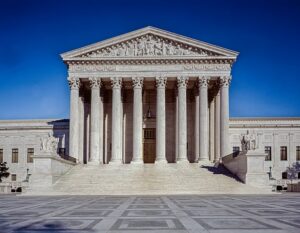
The U.S. Supreme Court rules that right to exclude others from private property is a fundamental element of property ownership.
According to its web site, the California Agricultural Labor Relations Board (CALRB) dedicates itself to “guaranteeing justice for all agricultural workers.”
In furtherance of that goal, the CALRB issued a labor regulation allowing union organizers temporary access to agricultural employers’ properties. Last month in Cedar Point Nursery v. Hassid, the United States Supreme Court ruled that the CALRB regulation overstepped constitutional limits.
The applicable CALRB regulation states that labor unions may “take access” to growers’ properties to promote union membership, for up to four 30-day periods each year, for one hour before work, one hour after work, and one hour during employee lunch breaks. The regulation allows entry for two union organizers per work crew, plus an additional organizer for every 15 workers over 30 workers in a crew.
In 2015, union organizers from the United Farm Workers entered a strawberry grower’s property in northern California employing about 400 seasonal workers at 5 a.m. The organizers shouted at workers with bullhorns and disturbed nursery operations.
That same year, union organizers sought to enter property owned by a Fresno grape and citrus grower that employed over 2,000 workers, but the grower blocked their access. None of the workers lived on the growers’ properties.
The growers filed suit in federal court to prohibit the CALRB from enforcing the access regulation, arguing that it operated as a physical taking of the growers’ private property, in violation of the Takings Clause of the Fifth Amendment. That clause plainly states: “[N]or shall private property be taken without just compensation.” The Takings Clause protects property rights against government seizures.
The federal district court rejected the growers’ argument because the CALRB regulation only allowed union organizers temporary access to the growers’ property.
Supreme Court Examines Takings Clause
After the Ninth Circuit Court of Appeals upheld the district court’s ruling, the Supreme Court agreed to hear the growers’ appeal. Chief Justice John Roberts wrote the Supreme Court’s opinion on the appeal, joined by five associate justices, three of whom had been nominated to the court by President Donald Trump. Associate Justice Stephen Breyer wrote a dissenting opinion, joined by two other associate justices.
The Supreme Court’s opinion noted that the Takings Clause obligates the government to pay “just compensation” to property owners when the government physically takes private property for public use. This holds true whether the government acquires private property by eminent domain, by physically possessing or occupying property, or by imposing use restrictions on property which the courts believe “go too far.” According to the court, when these takings occur, “the government must pay for what it takes.”
The court also noted that the right to exclude others from private property is a fundamental element of property ownership. The court cited prior cases where physical takings had occurred without the government seizing actual possession of private property, such as low overflights by military aircraft and impositions of access easements. The court noted that physical takings, even if only temporary or sporadic, require payment of just compensation to property owners.
Based on those principles, the court ruled that the CALRB access regulation granted labor organizations “a right to invade” the growers’ property and therefore constituted a per se physical taking of property without just compensation. The court reversed the Ninth Circuit’s ruling and remanded the case for further proceedings. After the court issued its opinion, the CALRB posted an announcement on its website, effectively nullifying its access regulation.
Case Illustrates Political Divide
Although the court’s opinion limits government intrusions on property rights, it confirmed that the government may require property owners to cede access rights in exchange for certain benefits, such as land use permits, without effecting a taking. The opinion also reaffirmed the government’s right to access private property for health and safety inspections and legitimate police power purposes.

Christopher Vaccaro
Justice Breyer’s dissenting opinion conceded that the CALRB regulation gave union organizers the right “temporarily to invade” private property. However, the dissent regarded the regulation merely as a temporary limitation on the growers’ right to exclude others from their properties. The dissent deemed that this temporary limitation did not amount to a Fifth Amendment taking requiring just compensation.
The court’s 6-3 ruling in Cedar Point Nursery reflects the so-called conservative-liberal split between the court’s justices, with three justices appointed by Trump joining in the majority opinion. The court likely would have rendered an opinion less favorable to the growers, if the 2016 presidential election had produced a different winner.
Christopher R. Vaccaro Esq. is a partner at Dalton & Finegold, L.L.P. in Andover. His email address is cvaccaro@dfllp.com.




 |
| 

